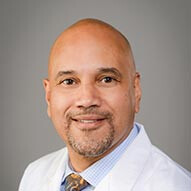Pediatric alpha-1 antitrypsin deficiency (A1AT)
Experts at Pediatric Liver (Hepatology) Disease Center at Children's Health℠ provide comprehensive care for pediatric alpha-1 antitrypsin deficiency (A1AT). Our teams use highly specialized training and experience to help kids protect their lung and liver health. That’s why the U.S. News and World Report ranks our hospital among the best in the nation.
What is pediatric alpha-1 antitrypsin deficiency (A1AT)?
Alpha-1 antitrypsin deficiency (A1AT), also called AATD or Alpha-1, is a rare disorder that can lead to liver and lung disease. It occurs when your child doesn’t have enough of a protein called alpha-1 antitrypsin in their blood. This protein protects the lungs and the liver from infection.
A child with A1AT deficiency can develop liver damage at any age. They may not develop lung disease until adulthood, and it can be made worse by tobacco smoke.
Risk factors
Only about 1 in 3,000 to 1 in 5,000 people in North America have this condition.
What are the signs and symptoms of pediatric alpha-1 antitrypsin deficiency (A1AT)?
Difficulty breathing
Chronic cough
Repeated lung infections
Environmental allergies
Fatigue (extreme tiredness)
Rapid heartbeat
Shortness of breath
Wheezing
Weight loss
Vomiting blood (due to liver damage)
Not all children with A1AT will show symptoms of the condition.
How is pediatric alpha-1 antitrypsin deficiency (A1AT) diagnosed?
Your child’s doctor may order a blood test to check A1AT levels and genetic phenotype in their blood if they have a family member with the condition.
If your child has low A1AT levels or tests positive with genetic testing, they may need tests including:
Lung function tests such as spirometry
A chest X-ray or CT scan of their lungs to check for scarring
A liver ultrasound to look for liver damage
A iver biopsy to check for cirrhosis
These tests determine how well your child’s liver and lungs are working.
What causes pediatric alpha-1 antitrypsin deficiency (A1AT)?
A mutation (change) in a gene causes A1AT deficiency. A child must inherit the mutated gene from both parents to get this condition. Parents might not have A1AT deficiency even if their child does.
How is pediatric alpha-1 antitrypsin deficiency (A1AT) treated?
Your child might never have complications from A1AT deficiency.
To help reduce their risk of complications, they should:
Exercise regularly
Maintain a healthy weight
Avoid exposure to toxic chemicals in the air
Avoid alcohol and tobacco smoke, including secondhand smoke
At Children’s Health, our expert pulmonologists and gastroenterologists work together to monitor your child’s health with regular visits.
A treatment plan is personalized for your child and may include:
Augmentation therapy - With this therapy, your child receives donated A1AT through blood infusions every week or month.
Medications such as inhalers - Asthma inhalers and medicines can help your child’s airways open up so they can breathe easier.
Antibiotics - can help prevent or treat lung infections.
Oxygen therapy - Your child may benefit from using an oxygen tank and mask to improve their blood oxygen levels if their lungs aren’t working well.
Pulmonary rehabilitation - can help strengthen your child’s lungs with different breathing exercises.
Liver transplant - It is very rare for a child to need a liver transplant for A1AT deficiency. We are the only children’s hospital in North Texas that offers liver transplants.
Pediatric alpha-1 antitrypsin deficiency (A1AT) doctors and providers
At Children’s Health, your child can receive care from a team of experts, all working together to manage A1AT deficiency. We offer comprehensive care to protect your child’s lung and liver health.
 Amal Aqul, MDPediatric Hepatologist
Amal Aqul, MDPediatric Hepatologist Sarah Barlow, MDPediatric Gastroenterologist
Sarah Barlow, MDPediatric Gastroenterologist Megha Mehta, MDPediatric Gastroenterologist
Megha Mehta, MDPediatric Gastroenterologist Charina Ramirez, MDPediatric Gastroenterologist
Charina Ramirez, MDPediatric Gastroenterologist Norberto Rodriguez-Baez, MDPediatric Hepatologist
Norberto Rodriguez-Baez, MDPediatric Hepatologist Isabel Rojas Santamaria, MDPediatric Gastroenterologist
Isabel Rojas Santamaria, MDPediatric Gastroenterologist